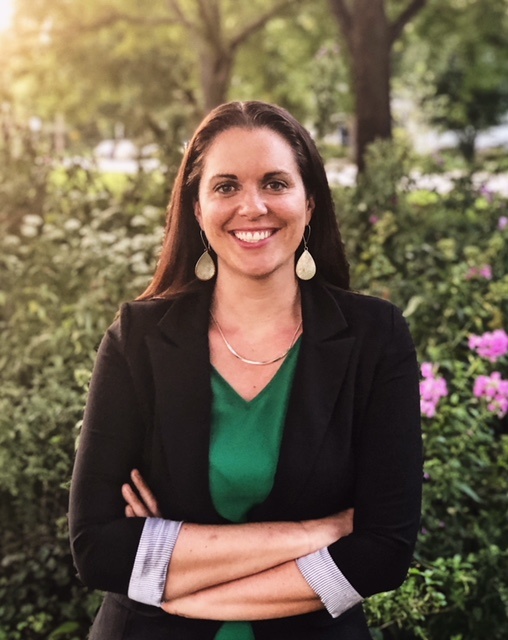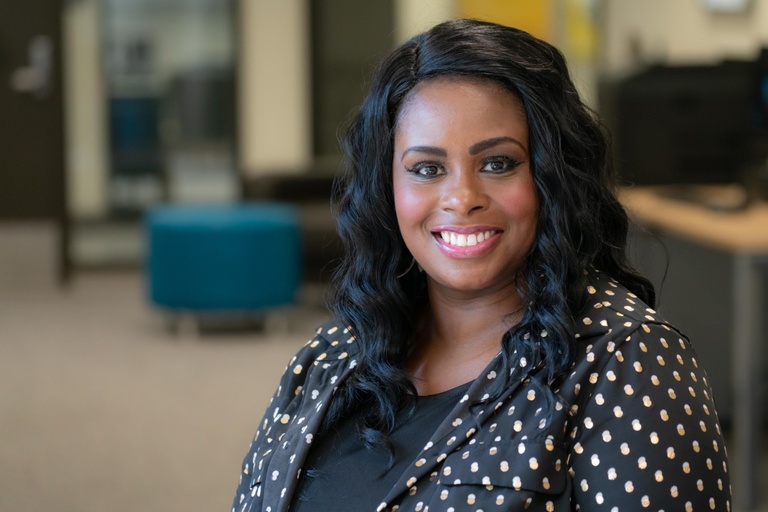By Sara Nelson
Roughly 600,000 Iowans live with some form of mental illness according to the National Alliance on Mental Illness (NAMI). Yet many Iowans still lack access to necessary mental health care due to systematic and cultural barriers. However, many College of Education faculty and alumni are dedicated to improving mental health access and care for Iowans.
Nationally, individuals are struggling with increased rates of anxiety and stress, and a greater impact of trauma. In addition to national struggles, Iowans are also facing increase in stress in agricultural communities, lack of access to mental health providers in rural areas, and stigma surrounding seeking mental health help.

“We know that one of the biggest barriers to getting help and seeking out treatment is stigma,” says Jill Kluesner (MA ’07 Rehabilitation Counseling), Certified Rehabilitation Counselor and owner of Jill Kluesner Consulting. “There is a fear that if we seek out support for our mental health that there is something inherently wrong with us. If you or your family member had a broken leg, would you think twice about getting professional help? Yet, when it comes to connecting to professional help for our mental health, there is often a lot of hesitation. Stigma is complex, yet we know that the number one way to combat stigma is through training and education.”
Prior to starting her consulting agency, Kluesner provided crisis counseling to victims and survivors of sexual assault at the Rape Victim Advocacy Program in Iowa City and worked as a senior behavioral health consultant at University of Iowa Hospitals and Clinics. She left her administrative role to start her own consulting firm after seeing an increasing need for mental health education in Iowa.
“My goal is to increase mental health literacy and decrease stigma around the topic of mental health and mental illness,” Kluesner says.
Kluesner works to increase mental health literacy through conference presentations on topics like the impact of trauma, the importance of providing support to family and friends, and workplace wellness. She also visits communities across the country to provide Mental Health First Aid Instructor Trainings through Mental Health First Aid USA to certify instructors to teach locally. The Mental Health First Aid course helps to equip the community with information on recognizing signs and symptoms and how to help family, friends, and community members get connected to supports and services. She has taught over 150 Mental Health First Aid courses in Iowa.
“If supports and services are available and individuals and families are informed on how to make those connections, then we have created a system which fosters individuals and families getting the help that they need,” Kluesner says. “The earlier we can get someone connected to treatment and support, the more likely they are to have better long-term outcomes and potentially prevent a crisis situation.”
Kluesner says that funding for mental health services is crucial to creating healthy communities.
“Funding for mental health services is vital for our communities. We need to understand that mental illness does not only impact the individual living with mental illness. Mental illness impacts our entire community. Many families, friends, and partners struggle to find appropriate services and supports for their loved ones,” Kluesner says.
Additionally, College of Education faculty are trying to help increase the type of mental health supports and the amount of services available to Iowans through training and research.
Two College of Education faculty, Martin Kivlighan, associate professor in counseling psychology, and Jennifer Sánchez, assistant professor in Rehabilitation and Counselor Education, were each awarded with a $1.3 million grant from the Health Resources and Services Administration to help address opioid and substance addiction in Iowa.
The state of Iowa currently ranks 46th in the number of licensed psychologists, and has seen an increase of opioid deaths by 250 percent in the last decade. The Center for Disease Control predicts that Iowa will be one of the states hit with the most dramatic increases in the next five years. Eighty-six of Iowa’s 99 counties are designated as having a shortage of mental health care providers.
Sánchez’s grant, Addressing the Opioid Epidemic: Improving access to Health Care in High Need and Underserved Rural Communities, will train Rehabilitation Counseling, Clinical Mental Health Counseling, and Counseling Psychology students to provide behavioral health care to individuals with opioid use disorder (OUD) and other substance use disorders (SUD) who are living in high need and underserved rural communities across Iowa.
Kivlighan’s grant, Graduate Psychology Training in Telepsychology and OUD and SUD Prevention and Treatment in Rural Iowa, extends over three years and will develop a new, interdisciplinary training program in telepsychology for opioid use and substance use disorder. The grant also provides funding to train eight students each year.
“The use of technology to enhance behavioral health care and enhance the services we’re already providing is only going to increase in the future,” Kivlighan says. “To be able to provide our students with a more specialized and formal training in that is going to help them be better prepared to serve their clients in innovative and new ways. It is a critical method for increasing access to care.”
The project will help establish a telepsychology clinic and enhance student training. Additionally, the project aims to create a student to teacher pathways program so students will be more interested in working in rural communities and sparking an interest in SUD and OUD prevention and treatment.
The grant works across programs in the College of Education, working with Sánchez and professor Saba Rasheed Ali, to create more opportunities for students and better support for Iowans facing opioid and substance abuse disorders.
“We’re capitalizing off of the expertise within this college. Collaborating across programs and disciplines is only going to enhance our students’ training and is by far the best approach to addressing this particular crisis in Iowa and serving the state,” Kivlighan says.

Erin Barnes, clinical assistant professor in Rehabilitation and Counselor Education, is also working to train the next generation of mental health counselors by teaching her students to take textbook knowledge and use it with a specific population. Currently, her students are partnering with the City of Iowa City Senior Center to provide mental health care to older Iowans, a population particularly at risk for mental health challenges.
“Challenges you may face with aging, surround dwindling of your support network, and income changes that can effect mental health,” Barnes says. “We are a product of our experiences and how we are socialized. Older Americans were not raised to explore their vulnerabilities. We aim to create a safe space for seniors to build the capacities needed to achieve their mental health goals.”
Barnes believes that working on one’s own mental health can increase sensitivity and support for the rest of the community.
“The steps that we take to actively address mental health not only affect us as individuals, but our community as well,” Barnes says. “When we, as individuals, make a concerted effort to become mentally healthy, we become more sensitive to the experiences of others. Becoming mentally healthy requires reflection, honesty, and patience. And through our individual efforts toward becoming mentally healthy, we ultimately learn to be more understanding and supportive of others in our community because each of us is working toward a similar goal.”
She also says that mentally healthy individuals help create a healthier community overall.
“Every step that we take, whether it’s through advocacy, direct services, or financial donations to mental health initiatives is going to help improve one individual’s experience and our collective experience. Anything you do to improve mental health is going to be a benefit to the community.”
Kivlighan says the need for access to mental health services is an issue on which the majority of Iowans can agree.
“Advocating for accessible and quality mental healthcare in Iowa is a way of saying this is what our state and our community values,” Kivlighan says.
Read more from our 2019-2020 alumni magazine
